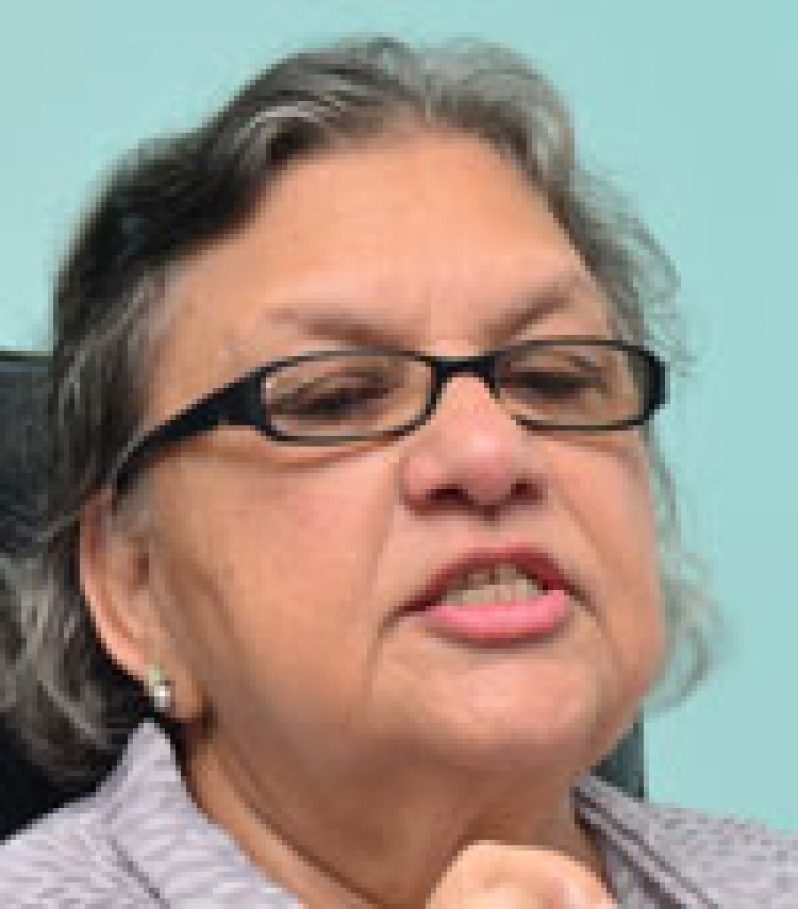CHAIRPERSON of the Guyana National Broadcasting Authority (GNBA) Ms. Bibi Shadick announced, yesterday, that approved broadcasters will have to pay a fee of $2.5M, annually, to continue their operations.
 Speaking at a press conference she hosted in her Lot 217 South Road, Georgetown, office, she explained that the Broadcast Act provides for the broadcasters to pay a fee for the use of the spectrum which has been worked out by the National Frequency Management Unit (NFMU) based on strength of transmission and other technical data. An annual licence fee will also have to be paid which may vary in some instances, she said.
Speaking at a press conference she hosted in her Lot 217 South Road, Georgetown, office, she explained that the Broadcast Act provides for the broadcasters to pay a fee for the use of the spectrum which has been worked out by the National Frequency Management Unit (NFMU) based on strength of transmission and other technical data. An annual licence fee will also have to be paid which may vary in some instances, she said.
For commercial operations, the licence will be 3% of the gross revenue of the entity for the previous year, based on submitted audited financial accounts, provided that the 3% is not less than $2.5M. For those new commercial broadcast operators who have just begun to broadcast, the fee has been fixed at $2.5M. These fees have been approved by the Minister of Information who has the approval of the Cabinet to apply them, Ms. Shaddick said.
She said the Board is also carefully examining all entities to ensure they do not operate illegally by broadcasting two distinct stations or signals instead of operating their various spectrums by way of relay or links.
Regarding fees to be paid for the use of the spectrum, entities are required to pay for their main broadcast spectrum, as well as their feeders and links spectrums. For example, TV Guyana Inc., has to pay for five spectrums, based on the primary Channel 28, on the secondary spectrum in New Amsterdam as well as two Georgetown links and one at Bushy Park. Telecor Radio will have to pay six spectrum fees for Georgetown, New Amsterdam, Skeldon, Linden, Bartica and Essequibo.
Ms. Shaddick noted also that there is a list of approved broadcasters currently operating who have not yet provided all their documentation so their licences for 2013 have not yet been approved. This list consists of nine TV operators, three radio operators and two cable operators. Still to provide relevant documentation are nine television operators, three radio operators and two cable providers.
With regard to the cable providers, Ms. Shaddick explained that there are those who provide analog services using hard cables and those that are digital using fibre-optic cables. E-Networks, Ali’s Broadcasting in Berbice and Quark Networks are those which use fibre-optic cables. Two of these companies have been approved, and in addition to a licence fee, they will have to pay a fee for the use of the spectrum.
Shadick disclosed that the GNBA has prepared 22 letters and, of that number, two are yet to be dispatched to the intended receivers for them to get their documents in order and some have been given additional time.
She said applications have to be made to the new GNBA because there are specific pieces of documentation that would have to be provided as part of the applying process.
Shadick said the GNBA has received less than 10 new applications for radio and television licences and those will be examined as soon as they are able to regularise the existing broadcasters.
SQUATTER SETTLEMENTS
She said, as the situation is now, the broadcasting field in Guyana could be compared to squatter settlements and there is a need for regularisation.
She said the licensing fees were set by Cabinet and the GNBA is focusing on implementation and broadcasters, who operate separate channels, as in the case of the National Communications Network (NCN) and WRHM, could find themselves paying for each.
Spectrum fees are also being charged separately, Shadick stated.
According to her, licences have also been approved for cable operators, but their payments are still to be set by Cabinet.
About the companies and agencies which may have had applications for radio and television licences before the GNBA was established, Shadick said “any application that was not made after the coming into force of the Broadcast Act is not an application that the GNBA will consider.”
She named the state-owned NCN and WRHM Channel 7 as two of the existing broadcasters who are still to complete their applications to continue broadcasting.
With regard to the radio licences that were issued by former President Bharrat Jagdeo just before he demitted office, Shadick said those licensees have been licensed to operate and will also have to pay fees, since there is no exception.
“There are no sacred cows in broadcasting,” she declared.
She said the GNBA is yet to establish its governing board and, clearly, it is in the infancy stage and awaiting approval from the relevant ministry to advertise its establishment.
LITTLE FASTER
Shadick told reporters that, in Trinidad, it took four years to create a similar authority but, in Guyana, they are trying to do things a little faster.
She said letters were sent to eight broadcasters who, under the Act, were described as approved broadcasters prior to its legislation and had been permitted to continue broadcasting. Then there are those who have been written to, asking them to submit certain documents so that their licences could be issued.
Shadick, a former Government minister, said that while the GNBA has received applications, there are a few applicants for new licences who have not yet been dealt with because the board is trying to regularise those who were in existence before issuing new licences.



.jpg)









